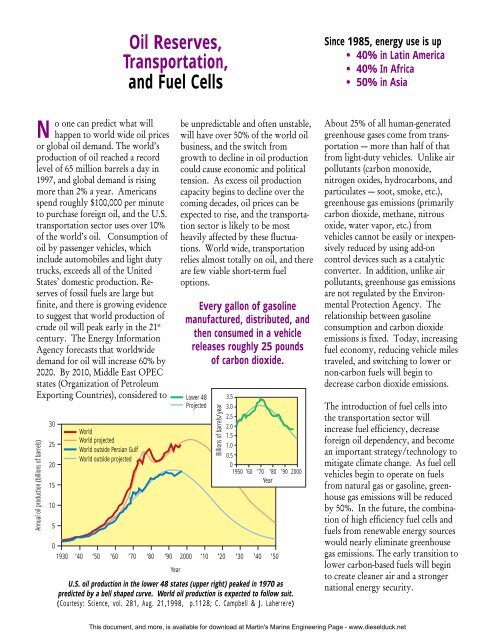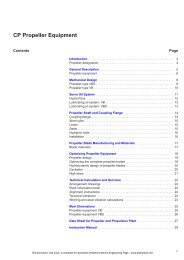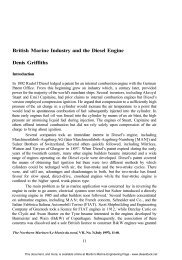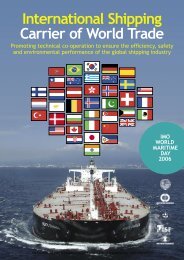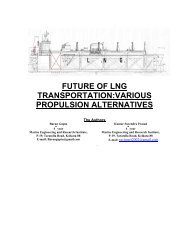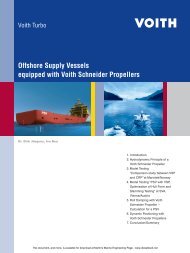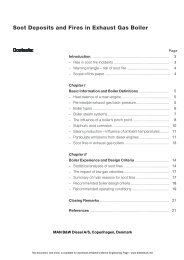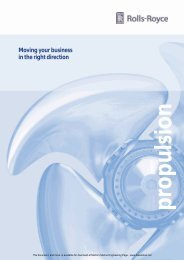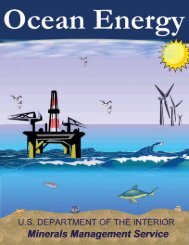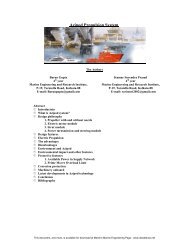Fuel Cells - Green Power - Martin's Marine Engineering Page
Fuel Cells - Green Power - Martin's Marine Engineering Page
Fuel Cells - Green Power - Martin's Marine Engineering Page
- No tags were found...
Create successful ePaper yourself
Turn your PDF publications into a flip-book with our unique Google optimized e-Paper software.
Oil Reserves,Transportation,and <strong>Fuel</strong> <strong>Cells</strong>Since 1985, energy use is up• 40% in Latin America• 40% In Africa• 50% in AsiaNo one can predict what willhappen to world wide oil pricesor global oil demand. The world’sproduction of oil reached a recordlevel of 65 million barrels a day in1997, and global demand is risingmore than 2% a year. Americansspend roughly $100,000 per minuteto purchase foreign oil, and the U.S.transportation sector uses over 10%of the world’s oil. Consumption ofoil by passenger vehicles, whichinclude automobiles and light dutytrucks, exceeds all of the UnitedStates’ domestic production. Reservesof fossil fuels are large butfinite, and there is growing evidenceto suggest that world production ofcrude oil will peak early in the 21 stcentury. The Energy InformationAgency forecasts that worldwidedemand for oil will increase 60% by2020. By 2010, Middle East OPECstates (Organization of PetroleumExporting Countries), considered toAnnual oil production (billions of barrels)30252015105WorldWorld projectedWorld outside Persian GulfWorld outside projectedLower 48Projected3.53.02.52.01.51.00.501950 ’60 ’70 ’80 ’90 2000Year01930 ’40 ’50 ’60 ’70 ’80 ’90 2000 ’10 ’20 ’30 ’40 ’50Yearbe unpredictable and often unstable,will have over 50% of the world oilbusiness, and the switch fromgrowth to decline in oil productioncould cause economic and politicaltension. As excess oil productioncapacity begins to decline over thecoming decades, oil prices can beexpected to rise, and the transportationsector is likely to be mostheavily affected by these fluctuations.World wide, transportationrelies almost totally on oil, and thereare few viable short-term fueloptions.Every gallon of gasolinemanufactured, distributed, andthen consumed in a vehiclereleases roughly 25 poundsof carbon dioxide.U.S. oil production in the lower 48 states (upper right) peaked in 1970 aspredicted by a bell shaped curve. World oil production is expected to follow suit.(Courtesy: Science, vol. 281, Aug. 21,1998, p.1128; C. Campbell & J. Laherre`re)Billions of barrels/yearAbout 25% of all human-generatedgreenhouse gases come from transportation— more than half of thatfrom light-duty vehicles. Unlike airpollutants (carbon monoxide,nitrogen oxides, hydrocarbons, andparticulates — soot, smoke, etc.),greenhouse gas emissions (primarilycarbon dioxide, methane, nitrousoxide, water vapor, etc.) fromvehicles cannot be easily or inexpensivelyreduced by using add-oncontrol devices such as a catalyticconverter. In addition, unlike airpollutants, greenhouse gas emissionsare not regulated by the EnvironmentalProtection Agency. Therelationship between gasolineconsumption and carbon dioxideemissions is fixed. Today, increasingfuel economy, reducing vehicle milestraveled, and switching to lower ornon-carbon fuels will begin todecrease carbon dioxide emissions.The introduction of fuel cells intothe transportation sector willincrease fuel efficiency, decreaseforeign oil dependency, and becomean important strategy/technology tomitigate climate change. As fuel cellvehicles begin to operate on fuelsfrom natural gas or gasoline, greenhousegas emissions will be reducedby 50%. In the future, the combinationof high efficiency fuel cells andfuels from renewable energy sourceswould nearly eliminate greenhousegas emissions. The early transition tolower carbon-based fuels will beginto create cleaner air and a strongernational energy security.This document, and more, is available for download at <strong>Martin's</strong> <strong>Marine</strong> <strong>Engineering</strong> <strong>Page</strong> - www.dieselduck.net


